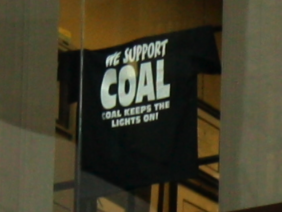While visiting my parents recently, my mother treated me to a 3-D showing of Avatar at a theater close to where I grew up. I went in with a fair amount of trepidation. I’ve been following the media coverage of the film, as well as conversations between friends and colleagues who had seen it in the weeks follow its premiere. I was feeling very nervous about the racial dynamics of the film, and though I’d heard many people describe the film as very pro-environment, I wondered how pro-environment a blockbuster movie could be; how much can its themes and messages really challenge the status quo of our fossil fuel-powered society?
After two and a half hours of pure visual spectacle, I left feeling a mix of emotions and with a ton of thoughts running through my mind. I felt angry. I felt very angry.
I felt angry that the Na’vi people needed an American to save them. I felt angry that the Na’vi people needed an American to save them from Americans! I felt angry for the truth at the heart of the action: the single-minded focus on profits over people and the environment, and the price indigenous people have paid for centuries.
The single most impactful moment for me was when the Head of Security, Colonel Quaritch, said
Our neighbors in Appalachia are all too familiar with the impact destruction can have on a culture and community. Mountains that were once home to cemeteries and burial sites with generations of a single family have been blasted away. What can root someone to a place more than knowing that his or her family lived and died there? Yet coal companies feel a few thousand dollars and paying below-market price for one’s home is just compensation. In Avatar, RDA Corp. felt that building a few schools and bringing vaccines would ingratiate them to the Na’vi. Schools and vaccines in exchange for your ancestral home and livelihood. Not quite a fair exchange.
In addition to processing my anger, I was also interested in asking my mother what she felt about the movie’s messages. In many ways, my mom represents her demographic well: married women in their late 40s and early 50s, working again, concerned about the economy, leaning right or solidly right in her politics. This is quite representative for the suburban Atlanta area where my parents live.
What did she think of the mining scenes: the endless, violent quest for energy sources? The corporate exploitation of another planet, and another people? She didn’t like any of these things, but here’s the kicker. When I asked, did the events of the film connect with anything happening in the world or United States today?
The answer: Nope. To be honest, my mother admitted not being very familiar with Mountaintop Removal mining, or Tar Sands mining in Canada. She felt strongly that what RDA Corp. was doing was wrong, but was unable to connect it to her life, or to our neighbors to the north. To me, this is the tragic failure of Avatar.
The parallels between Avatar and Mountaintop Removal are obvious. Other bloggers have also done great work drawing the parallels between Ecuador, Nigeria, even to the Disney version of the Pocahontas story (www.itsgettinghotinhere.com for starters). There are numerous scenarios to draw parallels from because the general arc of the story is so identifiable, so repeated across world history. The basic story is this: a multi-national, or in this case, multi-planet, corporation finds a valuable natural resource deposit near or in an area occupied by an indigenous community. The corporation tries various ways of “negotiating” with the locals, but ultimately ends up using violence and Western weaponry to take the resources by force. Perhaps there is a cultural go-between working the lines; someone from the colonizing culture who becomes familiar with the indigenous culture. This person will sometimes learn the value of the indigenous culture, and perhaps try to show the colonizers the error of their ways. In the end, it always ends the same, at least in real life.
The unique angle Avatar has is its focus on the natural resource being an energy source. Unobtanium looks remarkably like coal, but is much more expensive and small amounts can be burned to create huge amounts of power. To get to the unobtanium, the corporation must use equipment and processes that look remarkably like those used in Mountaintop Removal mining in Appalachia or in Tar Sands mining.
This film is also unique in how the indigenous culture triumphs over the colonizers. However, they don’t do it alone. In Avatar, the deity, Eywa, unites the planet of Pandora against the invaders, mobilizing all the planet’s different creatures, large and small, in the fight to preserve the planet. This could be an apt metaphor for Climate Change. Is the Earth signaling her alarm system? Telling us we’ve gone too far, and if we don’t retreat, rethink, and rehabilitate our ways, there will be significant human costs?
In addition to being the highest-grossing film in the history of film, Avatar is getting so much attention in the press for a couple of reasons. It was a huge financial gamble for Director James Cameron and the studio. Avatar is nominated for Academy Awards for Best Picture and Best Director, and it has also inspired tremendous international activism around environmental issues and human rights abuses. A few weeks ago, Palestinians dressed up as Na’vi people, drawing a comparison in their struggles against Israeli occupation of Palestinian land. Indigenous communities in the US and Canada have also compared the struggle of the Na’vi people in the film to their own lives, especially as the United States government has a long history of extracting valuable resources and fossil fuels from sovereign Native American land.
The 82nd Annual Academy Awards aired last night, and Avatar did not win Best Director or Best Picture. Avatar won a handful of awards for its technical achievements, which are well deserved. Had Cameron made it to the stage to accept an award, there would have been a lot riding on his statement. He recently claimed he is the greenest director of all time at a recent NRDC event. The quotes are captured in a write-up on Grist.org, here.
Had James Cameron won, I know what should have been in his acceptance speech: the recognition that the story of Avatar is hundreds of years old, and is being repeated with a slightly different cast every year, all across the Globe. Americans need to wake up, and realize the alarm is sounding. It’s time to act.
The team who won Oscars for Best Art Direction got close, saying “Avatar is a film about learning to see the world in new ways.” Winner Joe Letteri also said, “And just remember the world we live in is just as amazing as the one we created for you.” Not quite as direct as I would have liked, but it’s a start.






 This past Saturday, over 75 climate change activists in Northern Virginia came together for the Northern Virginia Climate Action Network’s Tools for Change III: Energy Efficiency, Bringing the Message Home and Skills Training. Attendees came from across NoVa, from Loudoun to Bristow, with the common goal of learning more and getting involved in the fight for federal climate change legislation.
This past Saturday, over 75 climate change activists in Northern Virginia came together for the Northern Virginia Climate Action Network’s Tools for Change III: Energy Efficiency, Bringing the Message Home and Skills Training. Attendees came from across NoVa, from Loudoun to Bristow, with the common goal of learning more and getting involved in the fight for federal climate change legislation.